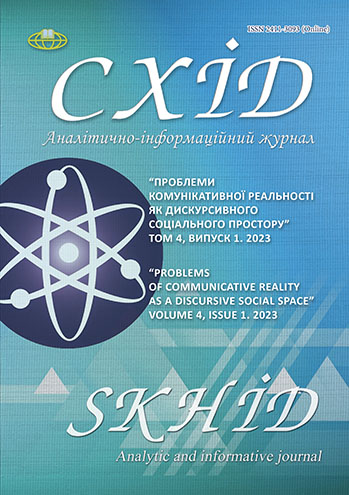Spatial Turn and Situational Approach: Ethical Dimension
DOI:
https://doi.org/10.21847/2411-3093.2023.4(1).277026Keywords:
Spatial turn, situational approach, situation, ethos, individualization, spatialization, temporalization, a priori scene, limit-boundary situation, situational reasonAbstract
The article is devoted to the explanation of the basic principles of the situational approach in the light of the modern "spatial turn", presented to the scientific community by the ideas of such world-famous modern theorists as D. Harvey and A. Lefebvre. Our main focus is the ethical dimension of the outlined problem field. The starting point is the ancient presumption of the etymological and semantic unity of ethos and space. The authors of the article conceptualize this synthetic unity, offer a set of certain principles and theoretical assumptions. The main result of the study is the interpretation of the situation as a space of a responsible individual act, a field of equal interaction of the individual with the external environment, circumstances, conditions, as well as a state of existence of a “specific material a priori/ a priori scene”. The authors formulate the following principles of situational vision: a) the primacy of the individual, the existential situation and the secondary nature of any external circumstances and conditions; b) the principle of “primary historicity”; c) the principle of “limit situation” as a transcendental-immanent unity; d) the principle of the situation as a mode of “a priori scene”. The most important constitutive procedures of the situation as a topos of the act of individuation are described: interiorization and immanentization, namely, situational and personal interiorization of the meaning of the main civilizational cultural-historical conflicts and immanentization of general ethical norms in one's own individual semantic field. The thesis is substantiated that the spatial-situational discourse has significant heuristic resources for the analysis of current socio-cultural and political processes in the modern world.
Downloads
References
Alekseeva, K. (2011). Poniattia sytuatsii u filosofskii antropolohii. Autoref. dis... cand. of philos. sciences. 09.00.04 – philosophical anthropology, philosophy of culture. Kyiv, T. Shevchenko Kyiv National University.
Artemenko, A. (2013). Topolohiia Ya v merezhevykh strukturakh sotsiumu. Kharkiv, Digital printing house No. 1. (In Ukrainian).
Bakntin, M.(1993). Towards to a Philosophy of the Act/ Translation¬ice by V. Liapynov. Edited by V. Liapynov and M. Holquist. Texas: University of Texas Press Slavic Series.
Cassin, B.& Crepon, M. & Prost, F. (2011). Moral/Etyka. Yevropeiskyi slovnyk filosofii. Leksykon neperekladnostei. Volume 2. Edit. B. Cassin. Kyiv: Dukh – i – Litera, 372-383 (In Ukrainian).
Cassin, Barbara (comp., ed.) (2004). Vocabulaire européen des philosophies : dictionnaire des intraduisibles, Paris, Le Seuil/Le Rober. https://www.scribd.com/document/468679632/1-Barbara-Cassin-Vocabulaire-europe-en-des-philosophies-Dictionnaire-des-intraduisibles-0-Le-Robert-Seuil-libgen-lc-pdf
Epstein, M. (2010). From the Golden Rule to the Diamond Rule. An Introduction to Stereo Ethics. Proceeding of the XXII World Congress of Philosophy (2008). Vol. 10: Korean Philosophical Association, 77-89.
Golubovych, I. (2009). Biohrafiia yak sotsiokulturnyi fenomen (filosofsko-metodolohichnyi analiz). Autoref. thesis... doctor philos. sciences: 09.00.03 – social philosophy and philosophy of history. Odesa: Odesa I. I. Mechnikov University. (In Ukarainian)
Golubovych, I. (1997). Metodolohichni problemy sytuatsiinoho pidkhodu ta yoho zastosuvannia v suchasnykh humanitarnykh doslidzhenniakh: Autoref. thesis... cand. philos. sciences: 09.00.03 – social philosophy and philosophy of history. Odesa, K. D. Ushinskyi South Ukrainian Pedagogical University (In Ukarainian)
Harvey, D. (2006). Space as a Key Word. In: N. Castree, D. Gregory (eds.) David Harvey: A Critical Reader. Oxford: Blackwell Publishing, 263-270.
Jaspers, Karl (1953). The Origin and Goal of History [translated by M. Bullok]. New Haven, CT: Yale University Press.
Kolinko, M. (2019). Mizhkulturna komunikatsiya: topolohichnyy vymir. Vinnytsya, TVORY Ltd. (In Ukrainian)
Lefebvre, H. (1991). The Production of Space. Oxford:Blackwell.
Loy, A. (2006). Sytuatsiia rozumu ta "sytuiovanyi rozum". Filosofska dumka, 3, 26-45 (In Ukrainian).
Philosophy and the Public (2022, September,12-15). Program of the conference, Humboldt University Berlin, September 12-15, 2022. https://gap11.de/en/-programme.html#KU
Podpora, A. (2011). Spatial Turn in Literary Research, Analysis and Reading Practices: Perspectives and Limitation. Topos:”Spatial Turn” in Contemporary Social Sciences and Humanities. Vilnius, 1, 81-91.
Popper, Karl R. (1957). The poverty of historicism. Boston, Beacon Press.
Prepotenska, M. (2014). Homo Urbanus: fenomen liudyny mehapolisu. Dnipropetrovsk, T. K. Serednyak Publischer. (In Ukrainian).
Rentsch, Thomas (2010). Konstytutsiia moralnosti. Transtsendentalna antropolohiia i praktychna fylosofyia [transl. from German V. Prykhodko]. Kyiv, Dukh-i-Litera. (In Ukrainian).
Shramko, Y., Khomenko, I. (2022). Modern analytic philosophy: historical origins and prospects of development. (Based on the materials of the 11th International Congress of the Society for Analytical Philosophy, September 12-15, 2022, Berlin, Germany). Sententiae, v. 41, 197-205 (in Ukrainian). https://doi.org/10.31649/sent41.03.197
Downloads
Published
How to Cite
Issue
Section
License
Copyright (c) 2023 Інна Голубович, Катерина Павленко

This work is licensed under a Creative Commons Attribution-NonCommercial-NoDerivatives 4.0 International License.
1. Authors bear responsibility for the accuracy of facts, quotations, numbers and names used.
2. Manuscripts are not sent back.
3. The publisher does not always agree with the authors' opinion.
4. The authors reserve the right to authorship of the work and pass the first publication right of this work to the journal under the terms of a Creative Commons Attribution-NonCommercial-NoDerivatives 4.0 International License. This license allows others to distribute (copy) the published work for non-commercial purposes, provided there is mandatory attribution to its authors and a link to the first publication in our journal.
5. The authors have the right to conclude separate supplement agreements that relate to non-exclusive work distribution in the form in which it has been published by the journal (for example, to upload the work to the online storage of the journal or publish it as part of a monograph), provided that the reference to the first publication of the work in this journal is included.

